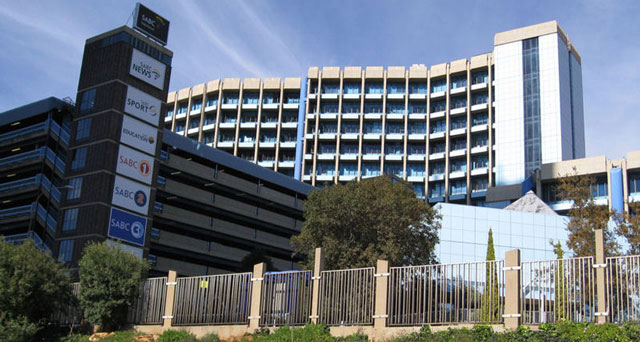
Controversy-plagued SABC acting chief operating officer Hlaudi Motsoeneng is going nowhere if his boss — the only person who can fire him — has her way. SABC board chairman Ellen Tshabalala said this week: “Hlaudi is diligent and very capable. The members of the board are right behind him.”
A group of opposition parties is going to lay criminal charges against Motsoeneng following a damning report released by public protector Thuli Madonsela on Monday. In the report, she said that he had irregularly received three salary hikes in one fiscal year, raising his salary from R1,5m to R2,4m.
Madonsela accused him of irregularly increasing the salaries of some staff and purging others, leading the public broadcaster to lose millions of rands in settlements and court action.
To top it off, Madonsela said Motsoeneng had committed fraud by claiming he had a matric on an application form.
But Tshabalala unashamedly supports him, even if he does not have the formal qualifications for the job.
“These are all historical matters. I would absolutely want him to stay in his post. What he really does is get the job done,” said Tshabalala, a strategic management consultant who has acted as president Jacob Zuma’s black economic empowerment adviser.
“This is a job Hlaudi was groomed for and promoted over a very long time. There are many similar cases like him in the country.”
Motsoeneng was described by popular cartoonist Zapiro as “the ultimate nutcase deployment” after Motsoeneng canned a prerecorded television interview with Shapiro in 2012, saying it would offend Zuma.
More recently, the broadcasting executive caused another outcry after he told the Mail & Guardian he wanted 70% of the news at the SABC to be “positive”.
Although Motsoeneng came under fire for promoting “sunshine” journalism, the forthright Tshabalala has only praise for him. She said that people should not be too quick to judge others for their lack of educational qualifications because of the history of the country under apartheid rule.
“We accept the public protector’s report and the board will take time to review it,” Tshabalala said.
“However, the board supports Hlaudi Motsoeneng. Hlaudi has not only done his job well, we have no doubt about his capability to deliver.”
Asked whether she wanted him to remain in his job, Tshabalala replied without hesitation: “Of course we want him to stay. I was interim chair of the SABC board and have spent time working closely with him.”
Tshabalala said there had been some volatile strikes at the public broadcaster. “[But] Hlaudi reaches a resolution with the unions. He speaks to them and arrests the situation. If we got a certified person, would that person be able to handle those negotiations?”
Laughing off suggestions that Motsoeneng might have manipulated three successive boards, as suggested by former staff members in their complaints to the public protector, Tshabalala said it had not happened in her time.
Rare quality
“Hlaudi is comfortable in such a unique parastatal. He also listens, which is one of those very rare qualities. When he does not understand, he asks.
“It is natural that in this country many young people did not have the opportunity to finish their schooling. Their careers are limited and they can’t apply for many jobs.”
Madonsela investigated allegations of maladministration, systemic corporate governance deficiencies, abuse of power and the irregular appointment of Motsoeneng at the SABC. In her report, she outlined how she found it “discouraging” that the current SABC board appeared to have sprung blindly to Motsoeneng’s defence on matters that preceded it.
“In fact, at times the submission made on behalf of the board appeared more defensive on his behalf than himself,” wrote Madonsela. “This is the case on the alleged fraudulent misrepresentation of his qualifications.”
Tshabalala told Madonsela that the submission was prepared by her lawyer, who knew of the events that happened before her time and she had considered it unnecessary to involve current board members, as they were not privy to the issues.
“I must indicate that I would not recommend a similar approach in the future,” wrote Madonsela. “As the chair of the SABC is not an executive, board decisions should be made by the board. Furthermore, the issues raised in my provisional report needed to be brought to the attention of the current board for it to apply its mind to the corporate government and ethical challenges it was stepping into.”
The allegations against Motsoeneng were made by former senior SABC staff. One of them, Phumelele Ntombela-Nzimande, who was the group executive in charge of human capital, was axed in a restructuring strategy aimed at cutting costs.
Ntombela-Nzimande told Madonsela her contract was terminated prematurely because she had raised several governance issues, mostly relating to the irregular appointment of Motsoeneng and his conduct.
Ntombela-Nzimande, who is the wife of higher education minister Blade Nzimande, walked away in 2011 with a retrenchment package of about R1,8m, which covered 14 months left on her contract and benefits.
Another former staff member who asked Madonsela to investigate was the SABC’s former acting chief operating officer, Charlotte Mampane, who stepped down from her post after the former board chaired by Ben Ngubane blamed her for the SABC’s poor performance before parliament’s public spending watchdog, the standing committee on public accounts.
Caught on camera
It was allegedly “the final straw” when she was caught on a security camera eavesdropping outside a board meeting in 2010 while her performance was being discussed.
The former staff members claimed that Motsoeneng, who allegedly lacked the skills for the job, manipulated primarily new boards and group CEOs to get his way and purged colleagues who opposed him.
The allegations that Motsoeneng purged senior staff members, leading to the loss of millions of rands paid out to settle the irregular terminations of contracts, were found by Madonsela to have been justified.
The public protector recommended that a public apology be made to Ntombela-Nzimande, Mampane and all former employees who were prejudiced because of the SABC management’s and board’s alleged maladministration.

In her findings, Madonsela said that the allegations that Motsoeneng’s appointment as acting chief operating officer was irregular was substantiated. Ngubane acted irregularly when he ordered that the qualification requirements for the position be altered to remove academic qualifications as previously advertised. Madonsela found it was clearly aimed at tailoring the advert to suit Motsoeneng’s circumstances.
“I am also concerned that Motsoeneng’s employment file disappeared, amid his denial of ever falsifying his qualification, and that, at one point, he used the absence of this information to support his contention that there was no evidence of this alleged fraudulent misrepresentation,” Madonsela stated.
But nobody at the SABC will be surprised if Motsoeneng survives the current upheaval. In March last year, he was fired by the previous board, in the absence of its then chairperson Ngubane. But he never budged from his office and remained firmly ensconced in his post.
Instead, Ngubane led the ANC-supported board members in a mass resignation, which had the effect of dissolving the board.
Motsoeneng is known to censor material critical of Zuma but he said he was not even aware that Madonsela had been turned away from appearing on a programme on the SABC’s SAfm radio on Tuesday, as he had been busy with his lawyers all week.
SABC spokesman Kaizer Kganyago said the reason for it was that the producers could not find other people to take part in the panel discussion.
Motsoeneng’s lawyer Zola Majavu said many of the issues the public protector had raised about Motsoeneng could be contested in a court of law and insisted his client had not committed fraud on an SABC application form.
Motsoeneng had been upfront about not having received his matric certificate, Majavu said, and had told the interviewer he could not accurately remember his symbols for some of the matric subjects he had passed.
In the end, the SABC, which had headhunted him for the job as he had been a regular freelancer, sent him on a bridging journalism course.
Majavu said Motsoeneng had also been dismissed from the SABC in 2006 for refusing to conduct a radio interview in Sesotho, preferring to do the interview in English.
Two years later he was rehired by advocate Dali Mpofu, then the SABC CEO, and nobody had asked for his qualifications at that time, Majavu said.
Wait-and-see approach
“The report is certainly reviewable,” said Majavu. “But we are going to wait to see if we have to challenge it, and our action will be informed by what the board does. It may well be that the board does not accept those recommendations, or they might accept some of them, or they might not accept them at all.
“The public protector has made recommendations but we will wait and see whether people making these decisions accept or reject the report.”
The protector advised communications minister Yunus Carrim to take urgent steps to fill the long-vacant position of chief operating officer with a qualified permanent incumbent within 90 days of the release of her report, but he said it not his role to do so. “It is the SABC board that decides on the appointment and refers their choice to the minister for approval,” Carrim said on Wednesday. — (c) 2014 Mail & Guardian
- Visit the Mail & Guardian Online, the smart news source




